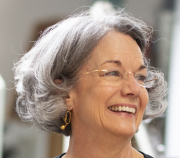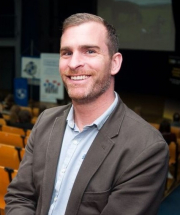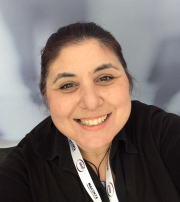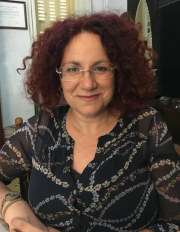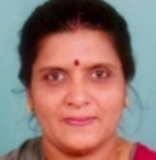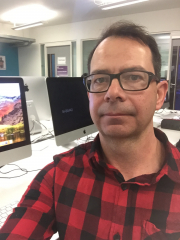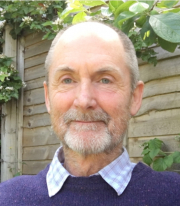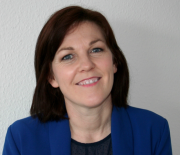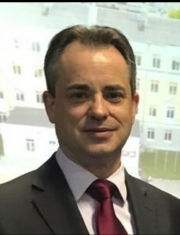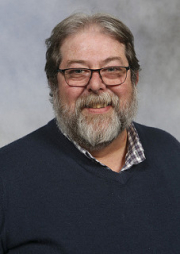8.00 - 8.45 UK time
Losing our bells and whistles: Will asynchronous teacher education return?
Catherine Walter, Past President of IATEFL
Abstract
We live in a rapidly changing environment. In our field, teachers and teacher educators have been asked to transfer classes online from one day to the next, using sophisticated platforms to reproduce face to face classrooms. Problems of connectivity and bandwidth are already emerging in this situation, and these problems may well become more prevalent. Synchronous online teaching may become seriously problematic. Is this all bad? I reflect on how online teacher education works when participants are not in immediate contact with one another, and on how it might have positive advantages over the synchronous classroom.
Bio
Catherine Walter was Chair (President) of IATEFL from 1993 to 1995. She is a teacher educator and researcher and taught online teacher education courses from 2003 until recently. Catherine has worked on English language teaching materials since the 1980s, currently the Navigate/Voyage course series and the Oxford English Grammar Course.
9.00 - 9.45 UK time
Teaching TED Online
Alex Warren, representing IATEFL Conference sponsor National Geographic Learning
Abstract
In many ways TED Talks are a perfect fit for the virtual English language classroom, not least because the content is already online and easily accessible for all. In this session we’ll explore how you can use TED Talks to supplement your core course content to not only keep your students engaged in an online environment, but also how, with a touch of creativity, they can be exploited to develop students’ key 21st century skills.
Bio
Alex Warren is a DELTA trained teacher trainer with over 16 years’ experience of working in ELT as a teacher, teacher trainer and academic director. He has presented and run workshops and webinars on a wide range of topics in over 30 countries.
10.00 - 10.45 UK time
IATEFL Associates getting together session 2
Speaker 1: Maria-Araxi Sachpazian, TESOL Macedonia Thrace
Overcoming the fear of serving on Teacher Association boards
Abstract
Serving on the board of a Teaching Association initially seems like a demanding burden on a busy educators’ time. Additionally, a variety of concerns crop up, such as financial management, decision making and finally the smooth running of the association. Unfortunately, increased fear of serving may lead to a very limited ‘’gene-pool’’ being present on the board. On the other hand, not thinking about our role on the board hard enough, might lead to people taking this duty lightly. This session aims to explore the roots, consequences and potential steps to cope with this issue.
Bio
Maria-Araxi Sachpazian BA Education / RSA Dip/TEFL (hons) is the Owner and Managing Director of Input on Education and a Lecturer in the English Studies Department of the International Faculty of the University of Sheffield, CITY College. She volunteers for TESOL MTh and IATEFL.
Speaker 2: Jean Theuma, MATEFL, Malta
New kids on the block
Abstract
The Malta Association of Teachers of English as a Foreign Language (MATEFL) has always dedicated itself to encouraging and supporting its teacher members to broaden their horizons and explore various aspects of the profession. So, for the Association’s 21st anniversary celebrations, MATEFL organised a conference where all the session speakers had never given a talk or workshop before. Jean’s presentation will explain how this celebration conference was created to give the new speakers the support and confidence to face an audience.
Bio
Jean Theuma has been a committee member of the Malta Association of Teachers of EFL (MATEFL) for the last 12 years, where she has been the IATEFL Liaison officer, newsletter editor and SIG coordinator. Jean is also proud to be a newly appointed committee member of the IATEFL Associates Committee.
Speaker 3: Dr. Revathi Viswanathan, ELTAI, India
Training teachers in digital tools for learner autonomy in communication
Abstract
As an IATEFL- Hornby Trust-funded project a two-day Master Teacher Training Workshop was conducted by ELTAI in February last. It aimed at training the convenors of our Chapters in the use of selected digital tools for promoting self-learning in communication skills among their students. In turn they were required to conduct similar ‘follow-up workshops’ for teachers and students in their respective regions. ‘Hands-on-training was provided to all the participants in using digital tools such as Nearpod, Tricider, Padlet, Trello, Google Docs, and Grammarly, to list a few.
Bio
Dr. Revathi Viswanathan, a former Professor & Head in the Department of English in the B.S.Abdur Rahman Crescent University, Chennai (India) is currently working as a freelance ELT Consultant and a Teacher Trainer. She trains both school and college teachers in teaching methods and the use of technology for developing communication skills among their students.
11.00 - 11.45 UK time
Press PLAY, press REC; don’t press STOP: Enhancing video use
Gareth Rees, representing IATEFL Conference sponsor Macmillan Education
Abstract
By considering video as both a viewing and a communication medium and informing our approaches with visual literacies and interactional learning principles, we can widen our use of video for effective language learning. Three aspects are considered: Multi-modality and acquisition; Visual literacies and communication; Interactional, reflective and self-directed learning through video creation/communication. Practical examples, drawing on both published materials and a teaching centre case study, and simple in-class activities illustrate the three aspects to the talk. Following the talk, attendees should be able to apply the way of thinking and activity approaches to their teaching context.
Bio
Gareth Rees is a teacher and teacher trainer and is currently head of EAP Overseas and Intercultural & Communication Training at the University of the Arts London (UAL). As a materials writer, he has worked for the British Council, producing www.teachingenglish.org site, BBC Learning English and established ELT Publishers, including Macmillan’s Language Hub.
12.45 - 13.30 UK time
Kitchen table teaching: Affective teaching online
Adrian Underhill, Past President of IATEFL
Abstract
The psychological atmosphere teachers create is as important as their method. We call this field of study “affect”. But is it something that has to get lost online? In this session we’ll consider the following:
1. What affect is, why it’s important, why it gets left out.
2. What we can learn from skillful facilitation, which at heart says, “Be yourself”.
3. A suggestion for online “Kitchen table teaching”. Could online teaching provide an affective game changer that unhooks us from our “noisy classroom omnipresence” ... to “talking across the kitchen table”?
Bio
Adrian Underhill is a trainer, consultant, writer and speaker. A Past President of IATEFL and current IATEFL Ambassador, ex director of International House Hastings, and author of Sound Foundations. He works with teachers and trainers incorporating natural human faculties such as intuition, playfulness and improvisation into classroom learning.
13.45 - 14.30 UK time
In this classroom, you’re empowered, welcome and safe
Hala Ahmed, representing IATEFL Conference strategic partner British Council
Abstract
Having worked with Syrian refugees, I’ve had the opportunity to see trauma effects on second language learners. These effects are magnified when learners feel marginalised, isolated or neglected. This presentation looks into how language classrooms can address empowering students as well as teachers to deal with traumas in language classroom and how this in turn would make of the classroom a safer and more inclusive learning environment. This will ultimately lead to giving a voice to young people and adults, building social cohesion in host communities and providing individuals with the skills they need to access work, services and education.
Bio
Hala Ahmed is a teacher trainer specialising in communicative teaching, materials development and course planning. She holds an MA in TESOL and has been with the British Council for 10 years, managing projects funded by UNICEF and the World Bank amongst others. When not working, she enjoys sport and music.
14.45 - 15.30 UK time
How do we teach when teaching online?
Laura Edwards, representing IATEFL Conference sponsor TELC
Abstract
Moving from the classroom to teaching online is a challenge many English teachers have been forced to take on in recent weeks. Getting to grips with video conferencing tools is just the first step, our teaching has to adapt too. Things feel different when we’re no longer sharing the same physical space. Motivating students is more difficult, as is building a sense of community among learners. Activities like pair-work, group discussions, brainstorming, writing and reading need a different approach to ensure they’re not neglected. This presentation offers tips for teachers starting out on how to avoid some of these issues.
Bio
Laura Edwards left Ireland after university to work as an English teacher. Now in Germany, she teaches adults and creates content for digital and print language tests. She has Master's degrees in Education Leadership and Education Technology. In her free time, she turns all devices off to read a good book.
15.45 - 16.15 UK time
Sustainable online teaching and learning
Andy Hockley, LAMSIG Coordinator
Cecilia Lemos, representing TDSIG
Sophia Mavridi, LTSIG Coordinator
Lawrie Moore, LASIG Joint Coordinator
Tyson Seburn, TDSIG Coordinator
Abstract
As a profession with varying degrees of online teaching and learning familiarity, we have needed to adapt quickly over the past several weeks. For some, it’s been a formidable transition; for others, it’s been trying to stay afloat; for all of us, it’s a move that has highlighted both insights and challenges. Now that this initial phase has happened, our focus can shift towards sustainability. This moderated panel brings together advice and collaborative discussion from the perspectives of digital learning pedagogy, management, teacher development, and learner autonomy.
Bios
- Andy Hockley is the Coordinator of LAMSIG. He has been involved in ELT (as teacher, trainer, manager, and management trainer) for over 30 years and is co-author of From Teacher to Manager (CUP, 2008) and Managing Education in the Digital Age (The Round, 2014). He lives in deepest Transylvania.
- Cecilia Lemos is a member of the TDSIG committee and has been in ELT since 1993, as a teacher, trainer and writer. A strong believer in continuous professional development, her main interests are assessment, feedback, and lesson observation. She is currently the academic manager for Richmond in Brazil.
- Sophia Mavridi is the Coordinator of LTSIG. She is a digital learning specialist & EAP lecturer and researcher. She is currently teaching in UK higher education as well as providing in-service training for institutions around the world. Her latest co-edited books are Digital Innovations & Research in Language Learning (IATEFL LTSIG, 2020) and English for 21st Century Skills (Express Publishing, 2020).
- Lawrie Moore is Joint Coordinator of LASIG. Originally from the US, Lawrie has been living and working in Vienna, Austria for over 20 years. She is an ESP/EAP lecturer at the tertiary level and a teacher trainer who enjoys supporting new EFL teachers in creating learner-centered classes and empowering their learners.
- Tyson Seburn is the Coordinator of TDSIG, but for this panel discussion, will serve solely as moderator.
16.30 - 17.15 UK time
Breaking down communication
Steve Lever, representing IATEFL Conference sponsor Express Publishing
Abstract
We all know that the emphasis in modern language teaching is on communication, but what does it mean to communicate ‘well’? In this session, we will break communication down into its constituent parts using two useful models, discuss what can cause it to break down and see how this can be avoided.
Bio
Steve Lever graduated from Leeds University in 1986. After working as a teacher of English as a foreign language for eleven years, he moved into ELT consultancy for Express Publishing in 2001. He now travels the world delivering workshops and seminars and has been a plenary speaker at many conferences.
17.30 - 18.15 UK time
Panel: Moving to teaching online
Moderator: Andy Johnson
Panel: Andy Johnson, Heike Philp, Joshua Underwood, Sandy Millin
Abstract
Recent events have led to a seismic shift in the amount of language training being delivered online. In this panel discussion we will look at the strengths and weaknesses of online delivery and the inherent challenges schools have faced pivoting from face-to-face delivery to online virtual classrooms. Answering as many of your questions as possible, we will also consider the longer-term implications of COVID-19 on the EFL and wider training industry.
Bios
- Andy Johnson is the Director of London School Online, which helps individuals and organisations to adapt to the changing workplace. Working with clients, stakeholders and industry specialists, Andy is passionate about applying new technologies and ideas to produce bespoke training solutions and course delivery.
- Sandy Millin is the Director of Studies at International House Bydgoszcz in Poland, where they made the shift to fully online teaching in March 2020. She is a blogger, teacher trainer and materials writer, and regularly presents at conferences and online.
- Heike Philp, CEO of Let's Talk Online sprl in Brussels, Belgium is an immersive language education specialist. She is co-initiator of four EU funded projects about language teaching and learning in real-time in virtual classrooms and virtual worlds and has been in web conferencing since 2003.
- Joshua Underwood is an online teacher and teacher trainer for British Council Bilbao. Having worked for 15 years in EdTech research, he now specialises in digital competences for educators and moderates teacher-facing MOOCS on Futurelearn. Josh’s interests include exploring ways human teachers and AI can work together to deliver better learning experiences.
18.15 UK time
Close of IATEFL Global Get-Together 2020
Gabriel Diaz Maggioli, Vice President of IATEFL
Bio
Dr. Gabriel Díaz Maggioli holds a Doctorate and Master's in Education from the University of Bath. He currently is tenured professor of TEFL Methods at the National Teacher Education College in Uruguay. A frequent presenter at local and international conferences, he has been fortunate to share his research and ideas with colleagues in the Americas, Europe, the Middle East, and Asia. He has recently been elected as incoming President of IATEFL. He is the author/co-author of more than 20 books and journal articles. His research interests are centered on teacher learning and professional development within a Sociocultural Perspective.

